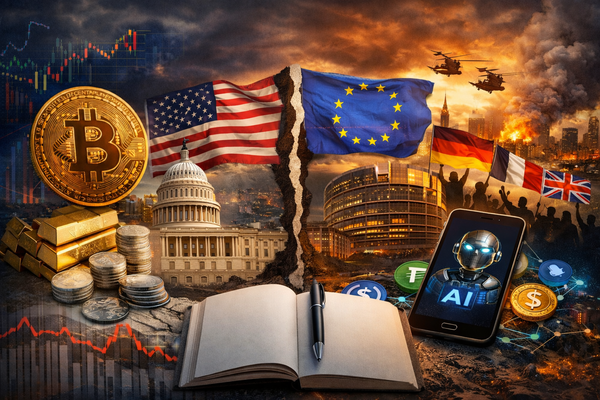The Real Great Reset
My case for optimism for the future of our governing class

Who is it you admire? Which qualities earn this admiration? Let’s ask this question not only for the people alive today but for the relics that have had constant respect throughout history. What constitutes a “great leader?” What achievements are necessary so that we read about them for generations? What makes them stand out as “great?” My childhood hero was the late Kobe Bryant. His work ethic, tenacity, and overall drive to be the greatest were inspiring to me as an adolescent. Elon Musk is another name I would put on that list. He is a man of great intellect that is, I would argue, innovating solutions to help humanity as a whole move forward. Our current time in history produces many great minds molding our future. Many brilliant, thought-provoking, and hard-working leaders that we will (hopefully) remember for their extraordinary achievements for many generations to come.
Conversely, it is interesting to me who I would not put on this list. I would emphatically not put Joe Biden, Donald Trump, or any of our current governing class. Gone are the days where great leaders took control of the helm and led our society forward through the treacherous waters and thick-binding fog. Where are the likes of George Washington, Thomas Jefferson, or Theodore Roosevelt? Where are the poised, rational leaders of Martin Luther King Jr or Abraham Lincoln? To think there was a time when those that led us were of such quality is heartbreaking when looking at those who do today.
Is this a problem of history? Will one day future generations read about our leaders in the same light as we read of Abraham Lincoln? I highly doubt it. It is difficult to imagine the intellectual gymnastics that would need to occur to view any in our governing class as “great leaders.” Moreover, I’m skeptical that we will ever view any as intellectual titans, driving philosophical and political theory forward as our leaders of the past have done.
Why is this the case? Let’s look at that question on its foundation. In today’s age, why would anyone want to get into politics? Would you? I sure wouldn’t want to. It seems like far too much trouble for very minimal gain. We have luckily set up a society where the incentives exceedingly favor private industry. Thought leaders, innovators, and intellectuals all have such easy means to convey their messages or solve their problems. Our age’s issues certainly aren’t easier, but the friction to solving them is as seamless as ever. To be most effective in accomplishing their goal, they do not need to be in politics to do it. No longer are problems of the day inhibited by the government. Frankly, it is easier to solve difficult problems the more government gets out of your way. This is why, in my opinion, most of the “great leaders” of our time avoid politics like the plague. Why would they subject themselves to the slow crawl of politics when our system encourages them to make a difference independently?
In a way, this was the goal. Great leaders of the past did not have this luxury. Instead, they used their intellectual prowess to craft a system that allowed great minds to independently create significant change. Each age has immense problems, and luckily, we are in one where you do not need politics to accomplish solving them. When more significant numbers are allowed to devote their energy to these problems, we can attain the correct progress swifter and more efficiently.
Then came COVID-19. Suddenly, we were at the whim of our government officials, and it was up to them to make crucial decisions regarding how we all could move about our daily lives. It was the first time I can remember where the government was making decisions that were directly affecting my life daily. I do not want to come off too harsh on those in these governing positions because I know they, for the most part, are friendly, kind, well-intentioned people, but it would not be a stretch to say: I did not have any faith in their leadership. I mostly found them incompetent, rash, and confused. Furthermore, I thought them petty, childlike, and more acting like students “playing government” in high school, rather than leading (Tulsi Gabbard said as much during her latest interview on the Joe Rogan Podcast). The hypocrisy, contradictions, and even simple explanations on decisions made with publicly available data was, at times, too much for me to take. At one point, California was receiving so much hate that they decided to keep important data in-house to conceal their overall incompetence even further.
I knew that I could not be the only one that felt this way. The great leaders, creators, and thinkers of our time were all now controlled by our governing officials’ ineptitude. For the first time, I can assume in all their lives, they had little say in decisions that were impeding their life’s missions’ successes. Elon Musk was quite vocal about what he felt was an assault on his freedoms, going so far as moving his primary residence to rid himself of faulty governing. We see this en masse with companies, throughout California, for example, relocating to Texas, Tennessee, and Florida. Even I started to consider a move to greener pastures.
When I first saw this trend, I recall thinking that this was a necessary type of “natural selection” for the states. Citizens, and great innovators especially, will vote with their feet, and states left in the dust will have to adapt and become places where companies will, once again, want to return. Unfortunately, this is a tough pill for many people to swallow. For example, I love California. My wife’s family is here. It is not easy to uproot your whole life because of bad governance. That is when I began to see stuff like this, and I became hopeful for the future:
If you recall @GavinNewsom here is my platform for Governor:
— Chamath Palihapitiya (@chamath) January 16, 2021
1) Cut CA income tax from 16% to 0%
2) free education vouchers for all kids
3) $2k for every new child born and raised in CA
4) make CA the global center of all tech and climate jobs
Who wants some?
Then following through with it as:
It’s on. #RecallGavinNewsom https://t.co/r8Cwd4szrn
— Chamath Palihapitiya (@chamath) January 26, 2021
For so long, the government provided a solid enough framework so great innovators could do their work relatively unimpeded. That was no longer the case. It became clear that once the pandemic started, many of those in places of power were not worthy of that position. In many instances, governments were leading their respective constituents in the wrong direction. This is where I am hopeful that the great minds of our time will step up to the plate. They will not be able to stand idly by watching the demise of what allowed them so much success. I am hopeful that an intelligent, rational, compassionate class of people will see the damage done from avoiding these political positions and rise to the challenge.
Our government was never intended to have what is prevalent today as “career politicians.” It was designed for ordinary business owners to step up, oftentimes part-time, and run cities alongside its people. Though I think society as a whole has changed too much for that to return, I am hopeful that, when problems arise, real leaders step up to the plate. When they appear, the general public will recognize those leaders and place them correctly in places of power to correct the trajectory of the ship. They no longer can sit on the sidelines because of all the political downfalls; they must bring us back on course. They might not stay there for long, but I am hopeful it will happen while necessary. We are a nation of hard-working thinkers, doers, and innovators, and I believe when push comes to shove, our real leaders will stand up and lead us back from the abyss.





